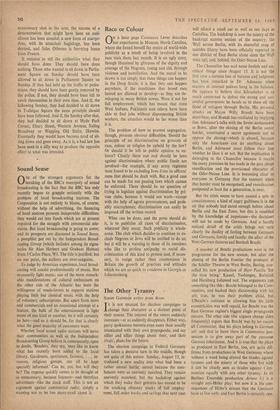Sound Sense
0 NE of the strongest arguments for the breaking of the BBC's monopoly of sound broadcasting is the fact that the BBC has only recently begun to grapple seriously with the problem of local broadcasting stations. The Corporation is not entirely to blame, of course; without the help of advertising, the financing of local stations presents insuperable difficulties; they would eat into funds which are at present required for the struggle with commercial tele- vision. But local broadcasting is going to come; and its prospects are discussed in Sound Sense, a pamphlet put out by the Independent Broad- casting Group (which includes among its signa- tories Sir Alan Herbert and Graham Hutton) from 5 Carlos Place, WI. The title is justified; but on one point, the authors are over-sanguine.
To judge by American experience, local broad- casting will consist predominantly of music. Not necessarily light music; one of the more remark- able manifestations of cultural enthusiasm on the other side of the Atlantic has been the willingness of music-lovers to support stations playing little but classical music with the help of voluntary subscriptions. But apart from news and commercials and an occasional attempt at a feature, the bulk of the entertainment is light music of one kind or another. So it will certainly be here--and so it should be, for that is clearly what the great majority of customers want.
Whether local sound radio stations will serve their communities as well as the Independent Broadcasting Group believe is, consequently, open to doubt. 'Readers,' they say, `may like to know what has recently been added to the local library. Gardeners, sportsmen, farmers, . . . in- vestors, religious groups, can all be kept specially informed.' Can be, yes; but will they be? The expense quickly comes to be thought of as unnecessary, because listeners—and therefore advertisers—like the stock stuff. This is not an argument against commercial radio; simply a warning not to be too starry-eyed about it.


































 Previous page
Previous page